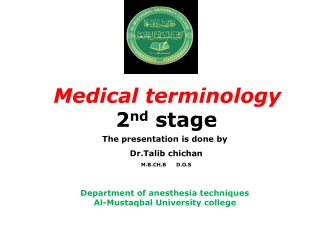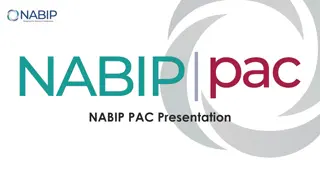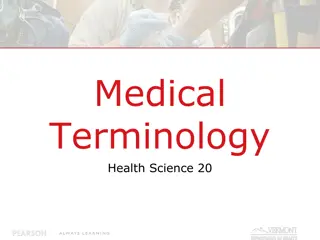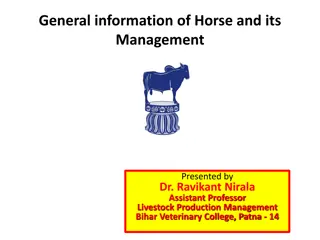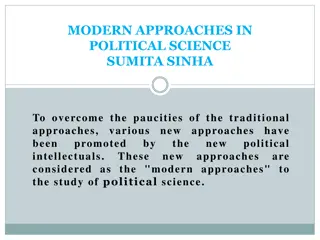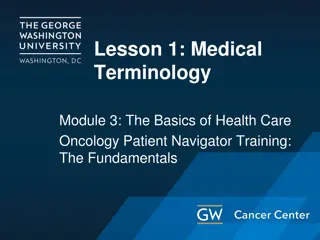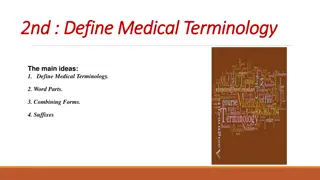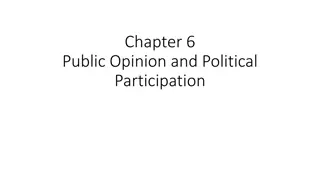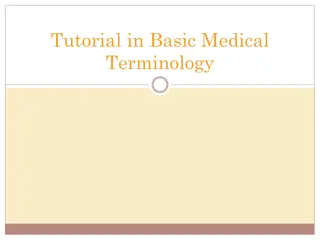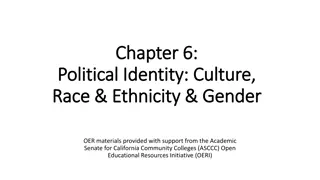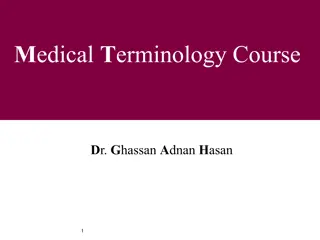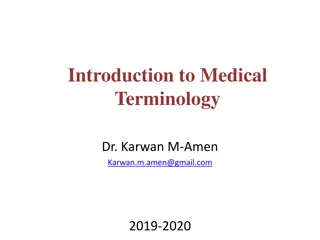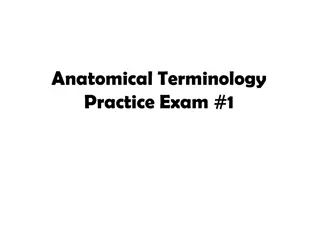Medical Terminology - 2nd Stage
Dr. Talib Chichan presents medical terminology related to the gastrointestinal system. Learn about the anatomy, terminology, and common conditions.
2 views • 18 slides
Understanding Medical Terminology: Suffixes and Their Importance in Healthcare
Explore the significance of suffixes in medical terminology, how they modify word meanings, and the importance of dissecting terms to understand their components. Learn how suffixes denote conditions, aid in pronunciation, and convey crucial information in healthcare terminology.
4 views • 65 slides
Understanding NABIP PAC: Political Action Committee Overview
Federal law prohibits direct financial contributions to federal candidates, hence organizations like NABIP establish Political Action Committees (PAC) to advocate for political priorities. Learn about NABIP PAC, its accounts, eligibility criteria, contribution rules, and how funds are utilized. Disc
1 views • 14 slides
Understanding Prism Terminology and Light Deviation
Prisms are optical devices that deviate light without changing its vergence. This module explores the various terminology associated with prisms, including Apex, Base, Refracting Angle, and Angle of Deviation. The passage of light through a prism follows Snell's Law, where the ray is deviated toward
4 views • 42 slides
Medical Terminology Health Science 20
Medical terminology is a specialized language used in healthcare to describe medical concepts concisely. It consists of prefixes, root words, and suffixes, which can be broken down to define complex terms. Utilizing proper medical terminology enhances communication among healthcare professionals and
3 views • 16 slides
Contrasting Concepts in Political Science: Normative vs Descriptive Approaches
Normative and descriptive concepts in Political Science explore contrasting viewpoints on how things should be versus how they actually are. While normative claims focus on value judgments, descriptive claims deal with facts. These concepts complement each other by providing both theoretical and pra
0 views • 10 slides
Horse Management and Common Terminology Overview
Dr. Ravikant Nirala, Assistant Professor at Bihar Veterinary College, presents comprehensive information on horse management and common terminology associated with equine production. The content covers the position of horses in the animal kingdom, terminology for different horse genders and ages, mi
0 views • 15 slides
Modern Approaches in Political Science: Overview and Characteristics
Explore modern approaches in political science pioneered by intellectuals to address the limitations of traditional methods. These approaches emphasize empirical data, interdisciplinary study, and scientific methods to draw conclusions beyond political structures and historical analysis. Key modern
1 views • 13 slides
Basics of Medical Terminology in Health Care Oncology
This module provides training on medical terminology basics for patient navigators in oncology. It covers defining terms using prefixes, root words, and suffixes, common oncology words, and available resources. Learn how to approach medical terminology effectively by understanding word roots and com
1 views • 20 slides
Understanding Medical Terminology: Key Components and Usage
Medical terminology is a specialized language used by healthcare professionals worldwide, rooted in Greek and Latin words. It comprises word parts, such as roots, prefixes, and suffixes, which are crucial for forming and understanding medical terms. The combining forms aid in pronunciation and help
2 views • 17 slides
Interdisciplinary Approach in Political Science and Its Relation with History
The need for an interdisciplinary approach in political science emerged in the 20th century to study political issues from various social science perspectives. This approach emphasizes the interrelation between political science and other disciplines like history. History provides the foundation for
0 views • 23 slides
Institutionalism and Methodological Issues in Political Science
Institutionalism is a foundational concept in political science, emphasizing the study of governing institutions and their role in shaping political behavior. It explores inductive and deductive approaches to research, highlighting the significance of empirical evidence and theoretical assumptions.
0 views • 19 slides
State-Sponsored Interreligious Dialogue in the Middle East: A Political Analysis
This research delves into the growth of state-sponsored interreligious dialogue initiatives in the Middle East between 2000-2020. It explores the political significance, impact on relations between political and religious authorities, and implications for religious practices in the region. The thesi
0 views • 23 slides
Understanding Gramsci's Political Theory and its Relevance Today
Gramsci's political theory, focusing on concepts such as hegemony, historical bloc, and the role of intellectuals, offers valuable insights into contemporary political challenges. Explored through the lenses of Prof. Ken Spours and Stuart Hall's analytical tradition, this analysis sheds light on Con
0 views • 13 slides
Understanding ICD-11 and ICHI: Terminology, Overview, and Purpose
International Classification of Diseases (ICD-11) and International Classification of Health Interventions (ICHI) provide a comprehensive framework for recording and analyzing health data globally. The system ensures semantic interoperability, integrates terminology and classification, and supports
4 views • 21 slides
Evolution of Citizenship in Liberal Democracy
Citizenship within liberal democracy entails equal rights, duties, liberties, and constraints for individuals within a political community. The entrenchment of civil and political rights has shaped the struggle for membership and participation in political communities. Civil rights, essential for in
1 views • 11 slides
Understanding Political Theory through a Contextual Approach
Exploring G.H. Sabine's perspective on political theory through a contextual approach, emphasizing the importance of historical context and societal influences. Sabine argues that while political theory evolves with its contemporary politics, it should be analyzed within its specific time and social
0 views • 9 slides
Understanding Public Opinion and Political Participation
Public opinion and political participation are influenced by various factors such as financial interests, family, education, and party identification. Measuring public opinion accurately through scientific surveys is crucial in a democracy. Traditional participation methods like voting and civic vol
5 views • 7 slides
Understanding Quarantine Structure and Terminology
Explore the structure and terminology of quarantine, including its purpose, restrictions, and terminology for zones and premises. Learn about the different types of quarantine premises, such as infected, contact, suspect, and at-risk premises, and understand the necessary biosecurity measures. Gain
0 views • 23 slides
Analysis of Facebook Affordances for Political Parties During the 2014 EU Elections
Research by Karolina Koc-Michalska and Darren Lilleker explores how political parties across 28 countries utilized Facebook affordances during the 2014 European Parliament elections. The study investigates the impact of social media on voter behavior, community building, and political engagement. Fi
0 views • 22 slides
Understanding Political Beliefs and Behaviors: A Comprehensive Overview
Explore the formation, evolution, and transmission of political beliefs, as well as the impact of differing beliefs and behaviors on the political process. Delve into platform issues, political affiliations, and their influences to gain a deeper understanding of the political landscape.
1 views • 53 slides
Understanding Nationalism in Political Science
Nationalism, a complex concept, defines the nation as the fundamental unit of political rule. It encompasses a mix of objective and subjective factors, including cultural, ethnic, and political traits. The definition of a nation is subjective, based on how its members perceive themselves as a distin
0 views • 27 slides
Understanding Political Science: A Comprehensive Overview
The study of political science delves into various aspects, from the pursuit of the good society to the exercise of power and the allocation of resources. It encompasses specialized fields such as American politics, international relations, comparative politics, public policy, and political philosop
0 views • 5 slides
Political Development Theory and Practice: An Overview
Political development refers to the evolution of institutions forming the political power system of a society. Initially popular in the 60s-70s to describe political change, it later fell out of favor for being Euro-centric but has since regained significance. The concept encompasses aspects like po
0 views • 13 slides
Political Party Funding Act 2018 Overview
The Political Party Funding Act of 2018 in South Africa aims to enhance multi-party democracy by regulating the funding and donations to political parties. It establishes the Multi-Party Democracy Fund funded by private sources, alongside the existing Represented Political Party Fund. The Act prohib
0 views • 17 slides
Understanding Political Party Funding Act of 2018
The Political Party Funding Act of 2018 regulates the funding of political parties in South Africa, ensuring equitable and proportional funding for parties participating in national and provincial legislatures. The Act defines various terms such as donations, foreign persons, and political parties,
0 views • 42 slides
Evolution of Political Ideas and Influences on American Founding
In the history of politics, major ideas like laws of nature, unalienable rights, divine right of kings, social contract theory, and rights of resistance have influenced the American founding. Various traditions such as Judeo-Christian, English common law, Enlightenment, and republicanism played a si
0 views • 68 slides
Basic Medical Terminology Tutorial and Exam Guidelines
Explore the basics of medical terminology, study materials, testing procedures, and course objectives. Understand the importance of Latin and Greek terminology in medicine, testing protocols, credit test information, attendance requirements, and course outcomes. Enhance your knowledge and skills in
0 views • 41 slides
Explore the Fascinating World of Political Science
The Department of Political Science offers a range of courses, delving into topics such as political theory, international relations, and governance. Understand the distinction between politicians and political scientists, and explore branches of political science like public administration and huma
0 views • 16 slides
Understanding Political Identity: Culture, Race & Gender in Society
Explore the intricate aspects of political identity, culture, race, ethnicity, and gender in society. Discover how individuals shape their identities and the impact of political mobilization on society. Uncover the significance of political socialization and the role of societal institutions in shap
0 views • 20 slides
Evolution of Political Protests in Modern Russia: A Historical Overview
This article provides an in-depth analysis of the evolution of political protests in modern Russia from 1990 to present. It discusses the attitude of Russian journalists towards protests, basic concepts of political protest in modern political science, myths surrounding protests in Russia, and the f
0 views • 24 slides
Impact of Political Stability on Equity Trading Costs of Cross-Listed Firms
The research explores the relationship between political stability and equity trading costs of cross-listed firms, highlighting the impact of political institutions, liquidity, and investor protection. It delves into the importance of factors like quality of political institutions, transparency, and
0 views • 24 slides
Interdisciplinary Relationships in Political Science
Political science and history share a symbiotic relationship, with history providing the foundation for political analysis while political science influences historical events. The contribution of economics to political science is evident in how economic conditions shape political ideologies and pol
0 views • 12 slides
Understanding Political Theory: Definitions, Differences, and Significance
Political theory encompasses systematic explanations of political phenomena, distinct from political thought which involves ideas and opinions of philosophers. It constitutes both political science and philosophy, addressing both empirical and evaluative aspects. The significance lies in finding sol
0 views • 7 slides
Remedial Measures Implemented by Indian Political Party
Explore the impactful remedial measures taken by a prominent political party in India through a collage presentation. Delve into the functions of political parties, understanding partisanship, the necessity of political parties, and more. Gain insights into the significance and role of political par
0 views • 23 slides
Medical Terminology III: Word Formation, Definitions, and Matching
Explore and practice medical terminology with exercises on word formation, correcting mistakes, translating, explaining derived words, matching terms, forming compound words, and identifying types of paralysis. Enhance your knowledge of Greek elements in medical terminology and test your understandi
0 views • 14 slides
Comprehensive Guide to Medical Terminology Course and Word Elements
Study medical terminology with the Medical Terminology Course by Dr. Ghassan Adnan Hasan to enhance your understanding of basic medical terms, word roots, and suffixes. Learn about word elements like roots, prefixes, and suffixes, and explore examples to grasp the essentials of medical terminology e
0 views • 41 slides
Introduction to Medical Terminology Course Overview
Medical terminology is a specialized language crucial for effective communication in healthcare. This course aims to equip students with essential knowledge on word structure, body organization, diagnostic terminology, and medical abbreviations. Upon completion, students will be able to analyze and
0 views • 9 slides
Anatomical Terminology Practice Exam: Body Regions and Landmarks
Test your knowledge of anatomical terminology by identifying various body regions and landmarks in this interactive practice exam. Practice naming cranial, cervical, thoracic, pubic, pectoral, axillary, brachial, and antecubital regions with the help of visual aids. Improve your understanding of ana
0 views • 32 slides
Veterinary Medical Terminology: Introduction to Body Planes and Common Terms
Explore the fundamental aspects of veterinary medical terminology, focusing on body planes, common terms for body parts, and root words. Learn about directional terms and how to use them appropriately in a veterinary context. Images and information from "Veterinary Medical Terminology, 2nd edition b
0 views • 20 slides
